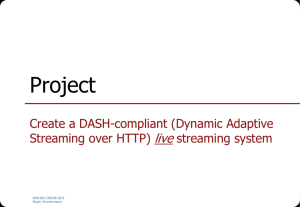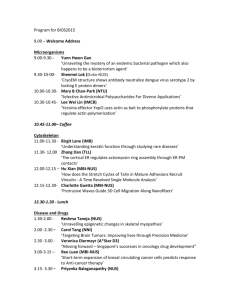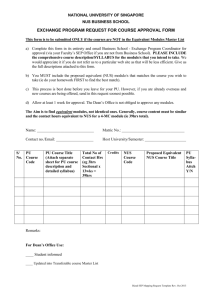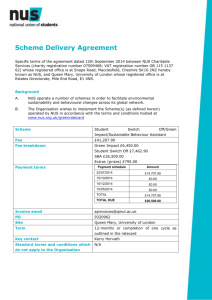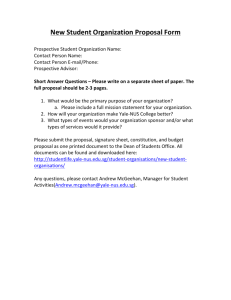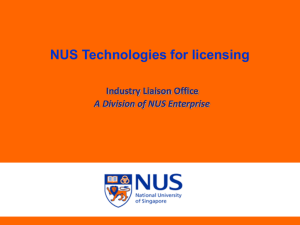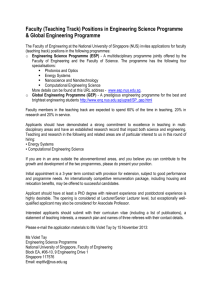05 Project & Servers
advertisement
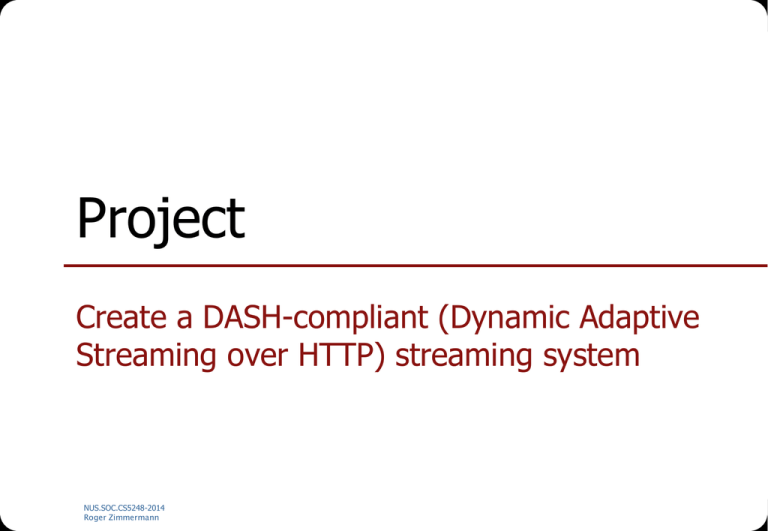
Project Create a DASH-compliant (Dynamic Adaptive Streaming over HTTP) streaming system NUS.SOC.CS5248-2014 Roger Zimmermann Goals (1) Capture a video on an ASUS Transformer/ Samsung Galaxy Note Pro tablet computer and store it as an MP4 file. Split the MP4 file into streamlets, i.e., 10 second long video files. Upload the streamlets to a web server. Transcode the streamlets into 3 different streamlets (e.g., low, medium, high quality). Create a playlist on the web server. NUS.SOC.CS5248-2014 Roger Zimmermann Goals (2) ASUS Transformer/Samsung Galaxy Note Pro runs the Android 4.2 Jelly Bean or 4.4 KitKat OS. Programming on Android is done in Java with the Eclipse IDE. On the web server, create scripts in the PHP language. Implement a simple Android DASH media player. NUS.SOC.CS5248-2014 Roger Zimmermann Project Homepage Descriptions and web links Some utilities and some library source codes Documentation (RFCs, etc.) IVLE Forums TA: Rajiv Ratn Shah (rajiv@comp.nus.edu.sg) NUS.SOC.CS5248-2014 Roger Zimmermann Advice and Actions (1) Form a team (3 persons). Note: You will need to read and learn a lot. Your program code will be quite small. HTTP POST command structure MP4Parser usage to create streamlets FFmpeg transcoder usage Playlist .m3u8 format in XML Start early (i.e., this week)! NUS.SOC.CS5248-2014 Roger Zimmermann Actions (2): Get your Tablet Check out your loan ASUS Transformer for the project from Mr. Chow from SoC Technical Services (on the 4th floor of AS6). There is one tablet per team (3 students). Please loan your tablet on 10/9 or 12/9, 2:00-5:30 pm, AS6-04-27. Email: chowcm@comp.nus.edu.sg. Tell Mr. Chow the 3 team member names. NUS.SOC.CS5248-2014 Roger Zimmermann Introduction to DASH Dynamic Adaptive Streaming over HTTP NUS.SOC.CS5248-2014 Roger Zimmermann DASH (1) RTP/RTSP/RTCP streaming faces several challenges Special-purpose server for media (complex) Protocols use TCP and UDP transmissions (firewalls) Difficult to cache data (no “web caching”) Advantage Short NUS.SOC.CS5248-2014 Roger Zimmermann end-to-end latency DASH (2) Main idea of DASH Use HTTP protocol to “stream” media Divide media into small chunks, i.e., streamlets Advantages Server is simple, i.e., regular web server No firewall problems (use port 80 for HTTP) Standard (image) web caching works NUS.SOC.CS5248-2014 Roger Zimmermann DASH (3) Original DASH implementation by Move Networks Introduced concept of streamlets Additional idea: make playback adaptive NUS.SOC.CS5248-2014 Roger Zimmermann Encode media into multiple different streamlet files, e.g., a low, medium, and high quality version (different bandwidth) DASH (4) MPD: Media Presentation Description ISO/IEC Standard: “Information technology — MPEG systems technologies — Part 6: Dynamic adaptive streaming over HTTP (DASH)” JTC 1/SC 29; FCD 23001-6 NUS.SOC.CS5248-2014 Roger Zimmermann DASH (5) Web server provides a playlist The playlist is a file in a specific format that lists all the available qualities and all the streamlets for each quality Playlist file extension is .m3u8 Content preparation: Original media file needs to be split into streamlets Streamlets need to be transcoded into different qualities NUS.SOC.CS5248-2014 Roger Zimmermann DASH (6) HTTP protocol is stateless! Server remembers “nothing” about session Scheduling logic, etc., is in media player! NUS.SOC.CS5248-2014 Roger Zimmermann DASH (7) DASH media player Loads .m3u8 file and then starts to download streamlets All the scheduling logic is in the player Render current streamlet while downloading the next streamlet before playback is done Measure bandwidth and switch between different qualities (i.e., adapt) Switch servers can be done easily NUS.SOC.CS5248-2014 Roger Zimmermann DASH (8) Many media players now understand DASH streaming format Many companies use HTTP streaming: Apple, Microsoft, Adobe, Netflix, … CDNs like this approach No need to run QuickTime, Windows Media, RealNetworks, and Flash streaming servers NUS.SOC.CS5248-2014 Roger Zimmermann Just use web server for everything!
